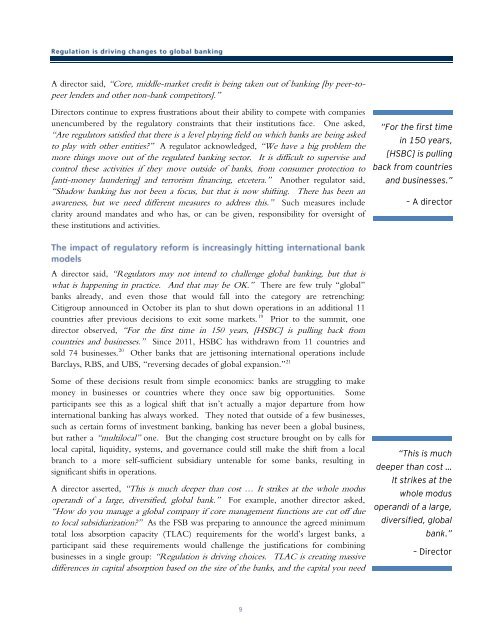Tapestry_EY_BGLN_Summit_View_The_future_of_global_banking-Dec14 (1)
Create successful ePaper yourself
Turn your PDF publications into a flip-book with our unique Google optimized e-Paper software.
A director said, “Core, middle-market credit is being taken out <strong>of</strong> <strong>banking</strong> [by peer-topeer<br />
lenders and other non-bank competitors].”<br />
Directors continue to express frustrations about their ability to compete with companies<br />
unencumbered by the regulatory constraints that their institutions face. One asked,<br />
“Are regulators satisfied that there is a level playing field on which banks are being asked<br />
to play with other entities?” A regulator acknowledged, “We have a big problem the<br />
more things move out <strong>of</strong> the regulated <strong>banking</strong> sector. It is difficult to supervise and<br />
control these activities if they move outside <strong>of</strong> banks, from consumer protection to<br />
[anti-money laundering] and terrorism financing, etcetera.” Another regulator said,<br />
“Shadow <strong>banking</strong> has not been a focus, but that is now shifting. <strong>The</strong>re has been an<br />
awareness, but we need different measures to address this.” Such measures include<br />
clarity around mandates and who has, or can be given, responsibility for oversight <strong>of</strong><br />
these institutions and activities.<br />
“For the first time<br />
in 150 years,<br />
[HSBC] is pulling<br />
back from countries<br />
and businesses.”<br />
– A director<br />
A director said, “Regulators may not intend to challenge <strong>global</strong> <strong>banking</strong>, but that is<br />
what is happening in practice. And that may be OK.” <strong>The</strong>re are few truly “<strong>global</strong>”<br />
banks already, and even those that would fall into the category are retrenching:<br />
Citigroup announced in October its plan to shut down operations in an additional 11<br />
countries after previous decisions to exit some markets. 19 Prior to the summit, one<br />
director observed, “For the first time in 150 years, [HSBC] is pulling back from<br />
countries and businesses.” Since 2011, HSBC has withdrawn from 11 countries and<br />
sold 74 businesses. 20 Other banks that are jettisoning international operations include<br />
Barclays, RBS, and UBS, “reversing decades <strong>of</strong> <strong>global</strong> expansion.” 21<br />
Some <strong>of</strong> these decisions result from simple economics: banks are struggling to make<br />
money in businesses or countries where they once saw big opportunities. Some<br />
participants see this as a logical shift that isn’t actually a major departure from how<br />
international <strong>banking</strong> has always worked. <strong>The</strong>y noted that outside <strong>of</strong> a few businesses,<br />
such as certain forms <strong>of</strong> investment <strong>banking</strong>, <strong>banking</strong> has never been a <strong>global</strong> business,<br />
but rather a “multilocal” one. But the changing cost structure brought on by calls for<br />
local capital, liquidity, systems, and governance could still make the shift from a local<br />
branch to a more self-sufficient subsidiary untenable for some banks, resulting in<br />
significant shifts in operations.<br />
A director asserted, “This is much deeper than cost … It strikes at the whole modus<br />
operandi <strong>of</strong> a large, diversified, <strong>global</strong> bank.” For example, another director asked,<br />
“How do you manage a <strong>global</strong> company if core management functions are cut <strong>of</strong>f due<br />
to local subsidiarization?” As the FSB was preparing to announce the agreed minimum<br />
total loss absorption capacity (TLAC) requirements for the world’s largest banks, a<br />
participant said these requirements would challenge the justifications for combining<br />
businesses in a single group: “Regulation is driving choices. TLAC is creating massive<br />
differences in capital absorption based on the size <strong>of</strong> the banks, and the capital you need<br />
“This is much<br />
deeper than cost …<br />
It strikes at the<br />
whole modus<br />
operandi <strong>of</strong> a large,<br />
diversified, <strong>global</strong><br />
bank.”<br />
– Director


